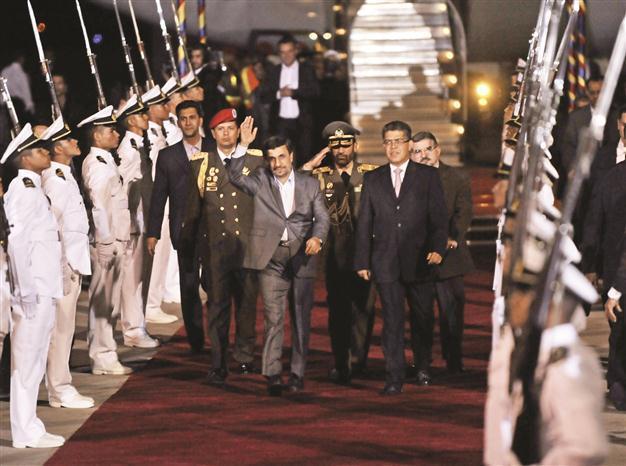Iran enrichment deepens tension
TEHRAN / ABU DHABI

Iranian President Ahmadinejad (waving) is welcomed by Venezuelan Vice-President Jaua (R) in Caracas Jan 8. AFP photo
ran started refining uranium deep inside a mountain, diplomatic sources said yesterday, as
Iran also confirmed the start of uranium enrichment at its underground Fordow nuclear plant under supervision by the International Atomic Energy Agency.
“All of Iran’s nuclear activities, including uranium enrichment in both Natanz and Fordow nuclear sites, are under the supervision of the International Atomic Energy Agency [IAEA],” Iran’s envoy to the agency Ali Asghar Soltanieh told Iran’s Arabic language al-Alam TV.
Diplomatic sources told Reuters in Vienna that Iran had started refining uranium in Fordow. The sources said uranium enrichment to a fissile purity of 20 percent had begun at the Fordow underground site near the Shi’ite Muslim holy city of Qom, signaling Iran’s defiance in the face of intensifying Western pressure to curb such activity.
“Yes, they have,” one Vienna-based diplomat said in response to a question on whether the enrichment operations had begun. Iran has said for months that it is preparing to move its highest-grade uranium refinement work to Fordow from its main enrichment plant at Natanz and sharply boost capacity. As the pressure from sanctions mounts, Iran has called for fresh talks on its
nuclear program with the permanent members of the Security Council and Germany (P5+1). Such talks have been stalled for a year.
Alternative route to Hormuz
Khamanei said yesterday Iran would not yield to the pressure of sanctions imposed by the West to get the Islamic Republic to change its nuclear course. “The Iranian nation believes in their rulers. Sanctions imposed on Iran by our enemies will not have any impact on our nation,” he said in a speech broadcast by state television. “Sanctions will not change our nation’s determination.”
“The Islamic establishment knows firmly what it is doing and has chosen its path and will stay the course,” Khamanei said.
U.S. Defense Secretary Leon Panetta said Jan. 8 the United States did not believe Iran was actively developing a nuclear weapon and reaffirmed Washington’s preference for diplomatic and economic pressure over military action as the way to deter
Tehran. But he bluntly warned Tehran against going from developing a nuclear capability to developing an atomic weapon.
“I think they need to know that if they take that step they’re going to get stopped,” he said. “Are they trying to develop a nuclear weapon? No. But we know that they’re trying to develop nuclear capability. And that’s what concerns us. And our red line on Iran is ‘don’t develop a nuclear weapon.’ That’s a red line for us.”
The United Arab Emirates’ energy minister also said a pipeline being built by the UAE to export oil from east coast terminals, avoiding the Iran-threatened Strait of Hormuz, will be operational by June. “The pipeline is almost complete. It will be operational within six months by May or June,” Agence France-Presse quoted Mohammad bin Dhaen al-Hameli as saying. Iran has threatened to close the strategic waterway at the entrance to the Gulf if the West presses ahead with a threatened embargo on its oil exports.
nuclear weapons,
